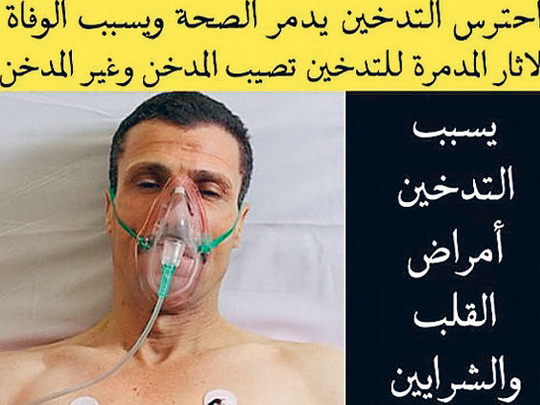
Cairo: Though a non-smoker himself, Mahmoud Rabae, the owner of a street kiosk in northern Cairo, admits that the bulk of his earnings are generated from tobacco sales.
"The fact that my kiosk is located near some governmental departments and private businesses makes it an attraction to smokers," Rabae, 56, said. "Most government employees prefer the locally made brands of cigarettes because they are affordable compared to foreign ones."
Rabae added that increases in prices of tobacco products, imposed by the Egyptian government in May 2005 as part of a package of rises in tax levies, did not discourage smokers.
"To many smokers in this country, a cigarette is a staple by means of which you can vent your frustrations," he said. "This addiction means a brisk business to me," he added with a broad smile.
According to a recent survey released by the World Health Organisation (WHO), there are around 13 million smokers in Egypt. The habit costs an average Egyptian family six per cent of its monthly income — perhaps more than on education and health, the same survey found.
Smoking in this country of 80 million people, where around 40 per cent of the population lives under the poverty line, is estimated to cost around eight million Egyptian pounds (around Dh5.5 million) annually as around 85 billion cigarettes are smoked per year.
"I started smoking around 30 years ago, starting with cigarettes," recalled Abdul Halim Sobhi, a 65-year-old pensioner. "I continued to smoke two packets of cigarettes a day for more than 20 years, after which I switched to shisha [water pipe] in the belief that it does less harm to health than cigarettes. However, I had to quit not because of the government's anti-smoking warnings but because I developed larynx cancer."
In the late 1980s, the government prohibited smoking at stations and inside trains of the Cairo Underground Metro, a service that has extended over recent years to crisscross the city. Offenders are punished with an on-the-spot fine of 10 pounds (Dh6.5). The ban is still in place, making the Tube the only public place where smoking is prohibited.
In June 2007, Egypt passed a law banning smoking at workplaces and at such institutions as health centres, schools and social clubs. The law threatens violators and even employers with tough financial penalties. But a visit to many such places will show that the ban is mere ink on paper.
Affordable
"Egypt is still one of the cheapest countries when it comes to tobacco purchases," said Mushira Khattab, Egypt's Minister of Family and Population. "Prices of cigarettes are affordable at shops and kiosks," she added.
In theory, tobacco sales to under-age smokers are prohibited. But again, in practice this ban is never observed. "Tobacco sellers do not ask their customers for identification cards," Khattab told a recent seminar in Cairo.
Around 439,000 children in Egypt under the age of 15 smoke, according to the Ministry of Health. Some 74,000 of them are less than 10 years old.
The WHO blames smoking for around 90 per cent of cancer cases in Egypt. Many sufferers of heart disease in the country are smokers too, says WHO.
More than two years ago, authorities made it obligatory for tobacco manufacturers to print on packets an image of a sickly man on a ventilation machine. But soon, the warning image became a funny public issue as the man in the picture sued the authorities for "tampering" with his features without consent.
Last February, another furore erupted when a new illustration was printed on tobacco products linking smoking to male impotency. The image was considered offensive in this conservative society.
Egypt is a haven for smokers, say experts. "Despite the soaring costs of living, tobacco is still affordable here," said Hazem Al Khudri, a cardiologist. "In addition, anti-smoking restrictions are rarely enforced," he told Gulf News. "The constant increase in the numbers of coffee shops, especially in major [Egyptian] cities, proves this."
Keepers of cafés admit that their business thrives — particularly in summer and during Ramadan. "In summer people prefer to come to our air-conditioned coffee shop to have cold drinks and smoke the shisha," said Mustafa Hamad, an attendant at a café in central Cairo.












